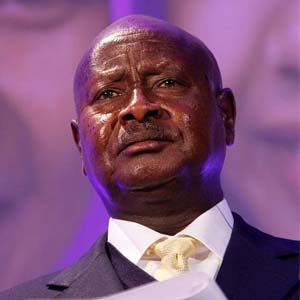
Public leaders rarely test for HIV in public in Uganda, despite recommendations from health workers that it would set a good example in a country that has seen HIV infection rates increasing. Uganda was once a global leader in efforts to fight Aids.
Not all government officials at the event in the capital, Kampala, joined the president in testing.
Putting love to the test
Ugandan officials have said they want to test 15 million people by the end of 2014. They acknowledge it will be hard to reach that target which is the reason they need the president to be a "role model".
"Therefore, all Ugandans, test [for HIV]. Find out your status and let the state and health workers manage you accordingly," said President Yoweri Museveni.
The HIV rate in Uganda stands at 7.3%, up from 6.4% in 2005, according to a 2011 survey by Uganda's Ministry of Health. Ugandan officials who presided over its reduction from 18% in 1992 to 6.4% in 2005 say they are confounded by the increase.
Ugandans health officials say more married couples are getting infected, in part because of what campaigners have dubbed a "sexual network" in which married Ugandans maintain secret lovers. One billboard in Kampala urges couples to "put your love to the test" by testing for HIV.
Museveni and his wife are "leading by example in a bid to roll back the HIV epidemic in Uganda," the Uganda Aids Commission, the local body tasked with fighting Aids, said, though the first lady did not attend the event where Museveni was tested.
Rampant stigma persists
Experts say HIV testing is critical to preventing new infections because those who know their status are less likely to engage in risky sexual behaviour. But getting people to test for HIV has proved difficult in Uganda, where rampant stigma persists and where thousands get infected each year.
The rise in new infections is stretching the ability of Uganda's government and donors to provide HIV and Aids treatment. More than 500 000 Ugandans need Aids treatment, many accessing it through the US President's Emergency Plan for Aids Relief, or PEPFAR.
If Ugandans reach their testing goal, at least 400 000 more people will likely be in need of Aids treatment, according to Musa Bungudu, the Uganda coordinator for the United Nations' Aids agency.
Uganda once earned a global reputation for successfully putting in place a policy called ABC: Abstain, be faithful, or use condoms.
Students of a certain generation were shown videos of the devastating toll of Aids on the human body, and then told to postpone the first act of intercourse. But critics of Uganda's policy to fight Aids say the country recently has focused more on treatment rather than prevention.
Uganda's government now has added male circumcision to the plan to fight HIV and Aids, in response to studies showing the procedure reduces the risk among African men of getting HIV in half.




 Publications
Publications
 Partners
Partners















